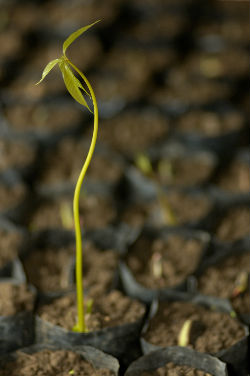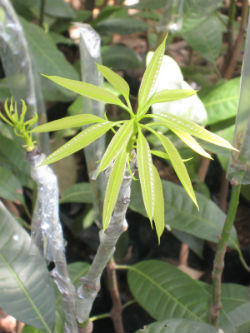Mango farming for profit and environmental preservation
MANILA, Philippines–Popular for their sweet taste and aroma, Philippine mangoes are among the most favored varieties of fruits in the world. One taste is all it takes to know that very few varieties would compare to its magnificent flavor.
Aside from being a delicious fruit, the Philippine mango is a thriving commercial product. The abundance of mangoes in the Philippines, over a million metric tons produced yearly; and the demand for it abroad, latest export earnings totaling $61 million; has developed mango production into a fast growing industry.
Versatile product
The mango’s versatility makes it a viable export product. Whether fresh or processed, it is a sure winner as practically all stages of the fruit’s development is suitable for processing. Unripe mangoes can be processed into hot or sweet pickles, while ripe ones can be prepared as slices in syrup or brine, mango juice, concentrate and puree, jam, chutneys, pulp fruit bar, mango wafer, mango powder, dehydrated mango slices, mango milk powder, and vermicelli.
Currently there are a little less than 7 million mango trees planted in some 158 thousand hectares over leading mango-producing areas in Western Visayas, Central Luzon, and the Ilocos Region. Pangasinan, famous for its sweetest of mangoes, account for 37 percent of the country’s annual yield of mangoes. Yet there is room for more mango farms as the export market shows huge growths in the volume of mango imports from the Philippines.
Hong Kong is the number one importer of fresh Philippine mangoes, while the USA received the biggest bulk of dried mango products. Mango juices and purees are a big hit in South Korea, while Japan buys the largest volume of mango juice concentrates.
Yes, there is money to be made in mango exporting. And with a projected export increase of 13 percent annually, this could easily mean big business if more attention is given to our national fruit.
One way to accomplish this is to encourage more people to take up mango farming. It is for this very reason that the Philippine Mango Seedling Farm Inc. was established. The company, which propagates and grows high quality, certified mango seedlings of the carabao variety, aims to make more people aware of the advantages of mango farming, and in the process, encourage entrepreneurs to set up their own mango orchards.
Starting small
Becoming a mango farmer may be easier than it seems. Information and tips about starting a small farm is readily available in books and the internet, as well as reputable seedling suppliers such as the Philippine Mango Seedling Farm, Inc.
For the new farmer, there is no ideal number of trees to plant. The number would really depend on how much one wants to earn. Even backyard growers who maintain as few as two mango trees are able to survive by depending solely on the income of these trees for their daily expenses.
Revenues from mango farming start coming in on the 6th-7th year which is why it’s crucial to source out the correct variety at the onset and make sure that the variety you plant (i.e., carabao variety) has commercial value. Barring unforeseen circumstances, a one-hectare mango farm should give a return of P100,000 per season, according to industry consultants .
Saving communities and the environment
The benefits of mango farming hardly end at profit making. The environment also comes out a big winner with the planting of mango seedlings. Mango trees, as opposed to the lumber trees such as mahogany, narra, and ipil-ipil, can contribute to the long-term development of the environment as its lower commercial value as lumber discourage loggers from cutting it down. As such they would make valuable allies for reforestation programs. The benefits of reforestation cannot be overemphasized: trees help to filter water, combat salinity, clean the air and increase flows into water catchments. They also provide food and shelter not only to humans but also to wildlife and are an integral part of our country’s biodiversity.
At the same time, being fruit bearing trees, mango trees create opportunities for livelihood in the communities where they are planted. The variety of products and sub-products to be derived from the mango tree, both for export and local use, is enough to sustain the livelihood of communities.
Best mango seedling source
The entry of the Philippine Mango Seedling Farm Inc. into the industry as a reliable and trustworthy supplier of mango seedlings is in response to the owners’ past experience of being misled or misinformed into buying unmarketable mango varieties. As such, they ended up as “victims” of backyard seedling growers who use improper grafting techniques / training to shortcut the process – a predicament they say is quite prevalent in the entire country.
The Philippine Mango Seedling Farm Inc. aims to protect aspiring mango farmers from buying the wrong type of seedlings, and spare them the agony of learning during harvest their investment will not generate the projected returns by propagating and selling only certified carabao variety mango seedlings.
Buyers at the Philippine Mango Seedling Farm Inc. will also enjoy access to literature on growing mango seedlings as well as information on mango orchard management and operations.
For more information on the Philippine Mango Seedling Farm Inc. please call 0915-4638899 or email info@mangoseedling.com.

